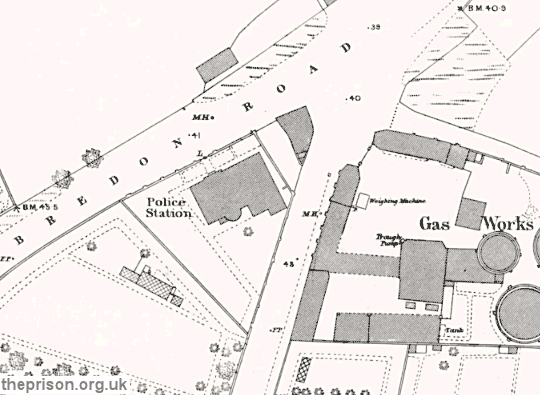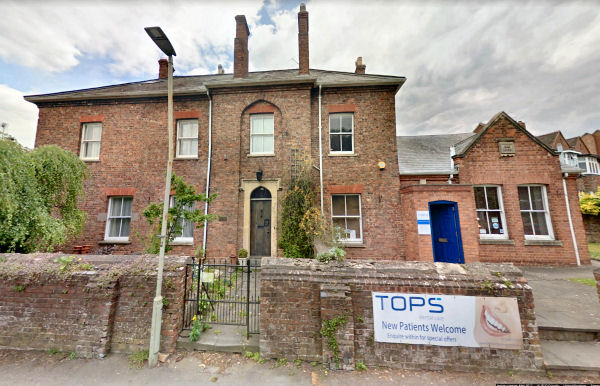Borough Gaol and Bridewell, Tewkesbury, Gloucestershire
In 1816, a Borough Gaol and Bridewell, or House of Correction, was established on Bredon Road, Tewkesbury.
In 1837, the Inspectors of Prisons reported on the establishment:
Construction.—There are two yards and no day-rooms at all. There are seven sleeping cells and one dark cell: there is also another cell, which forms a passage, and which might be used either as a day-room or as a sleeping cell. In no cell do more than three prisoners sleep. The greatest defect is the absence of a proper yard for the female prisoners. Most of the cells are light and large enough to read in and to work in conveniently. The dark cell is ill ventilated; it seems never to be used for punishment; but night charges are placed there. One cell, called solitary, forms one of the seven sleeping cells above enumerated. The prison has a boundary wail, and is not overlooked.
Management.—The keeper is serjeant of the new police of this town: he derives no salary as such. His salary, as keeper, is 55l. per annum, and he obtains also coals, soap, and candles. His wife acts as matron; but she does not appear to have received any orders to that effect from the magistrates, and she has no salary. Night charges are admitted here. There is no station house nor lock-up house; at least, none in use except this prison. There are some written rules, but no printed ones. The gaoler has received no fees since his appointment. Debtors are admitted here, but they come very rarely. This prison is entirely under the control of the town council. In one cell, I found one wooden bedstead, and three men sleeping on it, with two mattrasses and two rugs. Tobacco is not allowed. Silence is not enforced. Two visiting magistrates have been appointed by the town council. The prisoners take their meals in their cells.
The treasurer has received only 18. s. 9d., as the profits of the prisoners' labour, from Easter 1836 up to 1st September 1837.
On 27th June 1837, at the time of my visit, there were 11 prisoners, of whom 3 were for trial, 2 of whom were males and one a female: 8 were convicted from the borough sessions, they were all males. The county magistrates do not commit any prisoners hither. One prisoner, committed for stabbing, has been sent to the prison at Gloucester. The greatest number of prisoners, for some time past, has been 15, of whom 1 was a woman. The smallest number was 5; the ordinary number is about 5 or 6. 75 prisoners have been placed here since 1st January 1837, out of whom 29 appear to have been for night charges.
Rules.—Letters are all read by the keeper; there is no other restriction as to letters; all may enter, and all may be sent out. No visits are allowed to the convicted prisoners, except by an order from the magistrates.
Diet.—The prisoners receive 1½lb. of bread, of the second quality, daily. They have, for breakfast, 1½oz. of oatmeal, seasoned with salt and pepper, made into rather more than a pint of gruel. For dinner, on Sundays and Thursdays, they have 12 oz. of beef, without bone, and weighed before it is dressed, and 1 lb. of potatoes. On Mondays and Fridays they have Frac14; of a pint of peas made into soup with the liquor of the beef, seasoned with pepper or ginger; on Tuesdays, 2lbs. of vegetables, or ¼lb. of cheese; on Wednesdays, 1½ oz. of rice, l½oz. of oatmeal, and ¼oz. of salt, made into broth, with seasoning of pepper or ginger; and on Saturdays, the dinner is ¼lb. of cheese. The above diet is for the house of correction. Those who are committed to the common gaol receive only l½lb. of bread: the written rule also allows them 1d. per day, but this has been withdrawn. The untried may receive food from their friends. If the debtors are poor, they may receive the bread-allowance only. No spirituous liquors are admitted for any one.
Labour.—There is a crank-mill here, at which four prisoners can work at the same time. The prisoners clean the prison, and perform any job which may be desired. The women sometimes wash and sometimes sew; the matron also washes. The crank-mill is not applied to any profitable purpose.
Clothing.—Convicts have a party-coloured dress; they have a shirt, stockings, shoes, jacket, waistcoat, and trousers. For the female convicts, a cap, handkerchief, gown, petticoat, shift, stockings, and shoes are provided. The untried have no dress found for them: the gaoler lately gave some of his own to an untried prisoner.
Bedding.—Consists, nominally, of a mattrass, two blankets, a rug, and two sheets. The stock is very insufficient.
Religious and other Instruction.—The chaplain performs Divine service and preaches a sermon on Sundays: he does not attend upon week-days: he receives no salary, and acts voluntarily as chaplain: he has no other duty. He lately sent 12 Bibles and some Prayer books for the use of the prisoners,
Care of the Sick, Disease, and Mortality.—The surgeon attends whenever he is sent for: he is generally present when a new prisoner is searched. Since September 1836, there have been about four cases from illness, in which the prisoners have been confined to their beds. Not any of the prisoners suffered from the influenza in the spring. No death has occurred since September. The surgeon receives payment for the medicines.
Suicide.—There has been no attempt to commit suicide.
Fire.—No alarm from fire has occurred since September.
Escapes.—No successful attempt has occurred during the gaoler's residence.
Number and Description of Committals from Easter 1836 to 1st September 1837.
| Charged with | Felony, shoplifting, and thefts of various descriptions | 70 |
| Receiving stolen goods | 1 | |
| Assaults, and obstructing the police in the execution of their duty | 48 | |
| Drunkenness and disorderly behaviour | 70 | |
| Leaving their families chargeable to the parish | 5 | |
| Misbehaviour in the house of industry | 9 | |
| Leaving their masters' employment | 4 | |
| Embezzlement | 1 | |
| Uttering counterfeit coin | 4 | |
| Hawking spirits without a licence | 2 | |
| Malicious injury to property | 1 | |
| For debt | 3 | |
| Non-payment of poor rates | 1 | |
| As vagrants | 14 | |
| Deserters | 2 | |
| Total | 235 | |
General Statistics.
No. I.—Progressive State of the Commitments. The prison register begins on 17th November 1815; from which day to the end of that year one prisoner only was committed.
| In 1816 | 9 | In 1827 | 69 |
| 1817 | 62 | 1828 | 93 |
| 1818 | 122 | 1829 | 160 |
| 1819 | 87 | 1830 | 30 |
| 1820 | 68 | 1831 | 114 |
| 1821 | 60 | 1832 | 83 |
| 1822 | 55 | 1833 | 89 |
| 1823 | 75 | 1834 | 64 |
| 1824 | 96 | 1835 | 59 |
| 1825 | 66 | 1836 | 147 |
| 1826 | 80 |
Solitary Confinement.—The longest time that this has been practised, during the gaoler's knowledge, has been seven days.
Punishments.—There appear to have been 21 since the year 1818. One was in 1836, when the culprit was put in irons.
Suggestions towards Improvement.
1. It should not be a lock-up house for night charges.
2. A matron should be appointed, should receive a salary, and should have her duties defined in writing.
3. New rules are required, and among them should appear a precise and strict arrangement respecting letters and visits.
4. The untried prisoners should receive some augmentation of diet, as, for instance, potatoes and gruel daily.
5. A screen is wanting in the chapel in order to conceal the women from the observation of the other prisoners.
6. A separate ward for the female prisoners is particularly necessary.
7. An infirmary room should be fitted up for each sex, and a bath or bathing-tub should be provided.
8. There is no suitable place for searching prisoners.
9. To enjoin silence.
10. To provide journal-books for the visiting magistrates, the surgeon, and the chaplain.
11. To provide more bedsteads and more bedding: there is not enough at present for all the prisoners.
12. It would be very desirable to confine the gaoler entirely to his duties in the prison, which require all his attention; on this account his office as police serjeant is an inconvenient bur then.
13. The prison should be enlarged; it will be scarcely possible to maintain good discipline there within its present contracted dimensions.
The prison site is shown on the 1883 map below.

Former Borough Gaol and Bridewell site, Tewkesbury, c.1883.

Former Borough Gaol and Bridewell, Tewkesbury, Gloucestershire, c.2008.
The prison was closed in 1854 and was subsequently used as a police station. The building was extended in 1902. It is now part used as a dental surgery and part as a private dwelling.
Records
Note: many repositories impose a closure period of up to 100 years for records identifying individuals. Before travelling a long distance, always check that the records you want to consult will be available.
- Gloucestershire Archives, Clarence Row, Alvin Street, Gloucester GL1 3DW. Holdings include: Register of prisoners (1815-54).
- The National Archives, Kew, Richmond, Surrey, TW9 4DU. Has a wide variety of crime and prison records going back to the 1770s, including calendars of prisoners, prison registers and criminal registers.
- Find My Past has digitized many of the National Archives' prison records, including prisoner-of-war records, plus a variety of local records including Manchester, York and Plymouth. More information.
- Prison-related records on
Ancestry UK
include Prison Commission Records, 1770-1951
, and local records from London, Swansea, Gloucesterhire and West Yorkshire. More information.
- The Genealogist also has a number of National Archives' prison records. More information.
Bibliography
- Higginbotham, Peter The Prison Cookbook: A History of the English Prison and its Food (2010, The History Press)
- Brodie, A. Behind Bars - The Hidden Architecture of England's Prisons (2000, English Heritage)
- Brodie, A., Croom, J. & Davies, J.O. English Prisons: An Architectural History (2002, English Heritage)
- Harding, C., Hines, B., Ireland, R., Rawlings, P. Imprisonment in England and Wales (1985, Croom Helm)
- McConville, Sean A History of English Prison Administration: Volume I 1750-1877 (1981, Routledge & Kegan Paul)
- Morris, N. and Rothman, D.G. (eds.) The Oxfod History of the Prison (1997, OUP)
- Pugh R.B. Imprisonment in Medieval England (1968, CUP)
Links
- Prison Oracle - resources those involved in present-day UK prisons.
- GOV.UK - UK Government's information on sentencing, probation and support for families.
Except where indicated, this page () © Peter Higginbotham. Contents may not be reproduced without permission.



